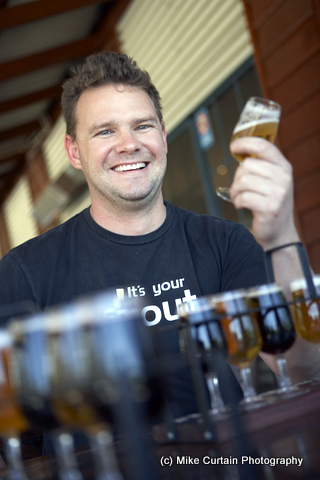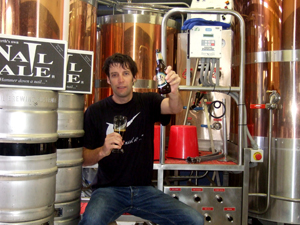
Two breweries for the price of one
In a global marketplace, it’s very rare for two competing companies to reach accord on a massive joint investment: not a merger, but a business arrangement where the costs and benefits are shared but the two brand identities remain distinct and separate. This is the arrangement undertaken recently in Western Australia by Feral Brewing and Nail Brewing, who have pooled finances to buy a new 50 hectolitre brewhouse (capable of producing 10 million litres a year).
Both breweries are sharing the facilities to produce their own range of beers independently.

Feral’s head brewer Brendan Varis
Brendan Varis of Feral, and John Stallwood of Nail Brewing, have both been in the brewing game for a long time, and are old mates – and old rivals. While the shared brewery arrangement is of singular benefit to both businesses, both men agree it’s not an arrangement they would have organised with just anybody.
“We have a different viewpoint on a lot of things,” says Stallwood.
“But we communicate and we’ve got a good relationship. We both want a big brewery, so the best way to get one is to share one.”
“I wouldn’t be able to do this with someone I didn’t know well,” agrees Varis.
“We’ve had very few crossed words, even though we’ve tackled a lot of the difficult subjects.”
The arrangement is quite unusual from a business point of view. It’s hard even to know what to call it – collaboration, joint venture – neither term captures both the way the partnership benefits both entities, as well as the requisite give and take on both sides. The joint ‘entity’ goes by the name of Brewcorp, although this is purely a trading name for the excise man, and both brewers are emphatic that their own brand names will remain separate. It seems to make sense to think of it more as a timeshare arrangement.
“John and the Nail team will come in and brew, and they’re going to leave us a nice clean brewery to work with, and we’ll give them the same privilege when we’re done,” Varis explains.
The advantages and implications of the new arrangement for both breweries are enormous. For Feral, Varis is happy that his sales staff will no longer be afraid to pick up the phone. As recipient of the Champion Large Australian Brewery award at the International Beer Awards, demand for Feral’s beers has far outstripped the capacity of their small Swan Valley brewpub. Varis says the new brewhouse will easily be able to supply their existing customer base, which alone should be enough to keep them financially stable.

Nail Brewing’s John Stallwood
Varis adds that he is looking forward to regaining the reins of his classic witbier, Feral White. To meet commercial demands, Feral White was contracted out years ago and Varis asserts it was a mistake to let other people take control of the recipe.
“One of the motivating factors in going into the new brewery is to get that back under our roof,” he said.
Meanwhile, Stallwood is most happy to find a permanent home for his Nail brewing operation. After Nail Brewing shut down in 2004, Stallwood has been operating a gypsy brewing business, first operating out of Jarrah Jacks brewery, and more recently using the brewing facilities at Edith Cowan University.
“Nail is 12 years old and pretty much been kept in bottles for a long time, so I hope distribution should grow rapidly,” Stallwood says.
“To be able to brew in this [new] brewery is a dream.”
The increased beer production and distribution – for both Feral and Nail – is something that all beer lovers should be excited about, particularly those of us who live on the east coast and only get the occasional taste of what WA brewers are cooking up. While Feral is a doyen of the festival scene and craft beer bars around Australia, only three of their lineup are regularly available in bottles. Varis says that there are already plans to add two more beers to their regular bottle range – one dark and one lager style. He is tight-lipped about specifics at this stage.
Nail beers, on the other hand, scarcely make it beyond the Gibson Desert, with the exception of their anniversary Clout Stout which retails for around $40 a bottle. The new digs will give Stallwood an opportunity to sell his oatmeal stout, Nail Stout, and his flagship Nail Ale nationwide, as well as giving him and his team the opportunity to develop and explore other styles, because – well, why the hell not?

The new brewery being installed
“I’m probably the only person in the world to have a brewery that’s too big for me,” Stallwood says.
Having grown the brewery’s brand slowly over 12 years of hard work in less-than-ideal conditions, Nail finally finds itself with a perfect space to grow, and a nation of thirsty beer lovers wait in anticipation.
The craft beer industry is famous around the world for its altruistic, friendly adherents and their mutual comradeship. Despite my temptation to draw a connection, Stallwood and Varis have each played down the craft beer camaraderie and how it relates to their new arrangement. To both of them, it’s merely a business decision that makes sense. However, as a beer lover myself it remains the most exciting and enjoyable piece of news in recent history. Aside from a potential increase in supply of great West-Australian beer, the fact that two rivals can see eye-to-eye and compromise in a way that mutually benefits themselves – and their customers – just gives me a warm beery kind of feeling.



